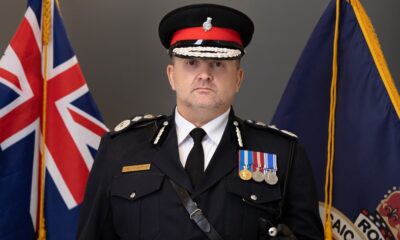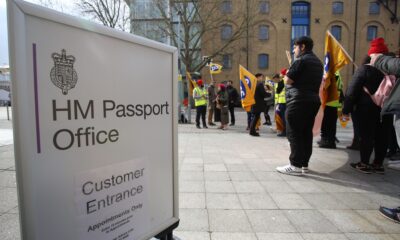Caribbean News
TCI: Governor’s Address – First Covid Anniversary
Published
5 years agoon

#TurksandCaicos, March 24, 2021 – Good afternoon. I have been invited to provide some personal reflections from the last year so I hope to explain what I think my long-term memories will be when, perhaps, I look back on this period in five years’ time. In other words the bigger picture.
I’ll start with what I believe will be my strongest positive and my strongest negative memory of the last twelve months, then talk about some of the big lessons I think I’ll remember, and end with my darkest potential fear and greatest possible hope for the year ahead.
The strongest positive will be about our people. Everyone in the Islands ended up on the front-line during COVID and the vast majority were magnificent throughout, and continue to be so. True – a very small number – failed the integrity test I described at the very start of the pandemic, putting others at risk while they sought either profit or momentary gratification – but compared to the rest of the world these individuals were a very small percentage of our number. I’m immensely proud of the people of TCI.

Beyond the population there are people who we have all relied on, many in front of me today, and many of us owe you more than we will ever know, such as Desiree Lewis (the Permanent Secretary of Health) and Denise Braithwaite (the CEO of the Hospitals) and those in support or alongside them, who have spent the full year working relentlessly – 15 hour days or more – often seven days a week.
I include in this list, because I saw it close up, the last Premier whose work ethic over the last year, and the attention to detail she paid to health, should be recognised today as we reflect back on where we were and where we got to. Health is after all a devolved issue. I should say I see all the same characteristics in the new Government who will now steward us towards the second anniversary next year. If the last 12 months was about a successful defence, the next 12 months is all about our counter-attack and how completely we all throw ourselves into regaining the initiative and retaking control of our future. More on this later.
When I think about the people who got us through this I include people across every profession and with any, and every, job title, in both the public and private sector, who adjusted and innovated and delivered in a way that has not only kept these Islands safe, but also kept us functioning in relative normality, compared to the rest of the region and indeed the world. You know who you are – so if you recognise in yourself the contribution you made – I can only thank you on behalf of us all.
And so to the overpowering negative. There is one thought that overshadows and that is the loss of our people to this wretched virus with – perversely-numbers of deaths now increasing, even as the vaccine is available on the Islands for those that wish it; a theme I will return to at the end.
Those lives shortened, and the sorrow it brings to those left behind, will be the abiding memory of this year. Attending a young Police Officers funeral service to mourn a further Police Officer, struck down not in the direct line of duty but through the impact of COVID, are memories that I will hold, but wish I didn’t have to.
Having lost my own father to Covid my family isn’t left untouched by this year’s events and when all other memories have gone, this is the one that will of course abide. There will be others listening who know exactly how this feels, and will also know that none of us want others memory of this period to be attached to this type of direct personal grief.
There are of course other consequences of this year that have hit families in other ways. For some this will have been the toughest year of their lives economically. When tourism stops the economy here stops. The obvious lesson from this year must be about diversification but it surely must also be about starting on the journey of having a proper safety net in place, that can catch the most vulnerable and most deserving, quickly, when unexpected calamity occurs.
And on that point, another memory I will hold is the magnificent NGO’s, in these Islands, who managed to achieve so much with so little. While we didn’t say so at the time Mandy – my wife – spent time working alongside them, regularly packing up food parcels – so our family had a very good and very regular insight into just how much good, these very good people in the TCI did, on behalf of the poorest of our Residents.
Quite probably the longest term consequence is that, as we acknowledge a year of COVID, we must also acknowledge a year that the schools have been closed. I’m personally delighted they are now on a planned course to full reopening. Education has been disrupted globally this year and what the longer term impact of that will be, no one yet knows, but there has to be an impact and every Government must plan for it, which I know ours is.
So as I think about this year I will think about the children of these Islands, what they were asked to sacrifice and how they managed, brilliantly, the challenges that none of us would have wished to face, at their age, particularly the disruption to friendships, fun and childhood freedoms as well as lessons.
Looking back, I will recall we started the pandemic without the means to fight it. We had little high dependency care capability, we had no Intensive Care Unit. We had little PPE. We had no testing capacity on the Islands. We had no closed ventilators. We had modern hospitals, but with very limited bed capacity, and those risked being overwhelmed extremely quickly. We had insufficient staff in our hospital. We had, and we continue to have, a health system built on treatment of our most serious cases outside our shores and when we were most in need, the region was closing down to us. All this, underpinned by a National Health Insurance Program that going forward cannot sustain, over the long term, the sort of costs that the pandemic has imposed but also modern medicine will bring.
The extremely tough and well observed lockdown – the use of emergency powers – the closure of the international borders and the stopping of our economy – not least because the rest of the world stopped travelling – saved us from the first wave of the pandemic and gave us just enough breathing space to build up capacity to give ourselves a fighting chance, although that capacity has recently been sorely tested.
So, in the future, I will reflect that at the end of the first year we were in an immeasurably better place than when this pandemic started. The extraordinary amount of hard work and grind by so many people who made that possible is a memory I will also hold of this year, for some time.
Another positive memory I will hold is the role the UK played. They stepped up. Facing a crisis alone is not a place you want to be – particularly when you were as ill-prepared as we were, and while it’s probably more appropriate for others to talk of the UK’s practical, comprehensive and rapid delivery of the stores, equipment and expertise we needed, I will personally remember a group of UK colleagues, here and in London, who fought for TCI as if their very lives depended on it.
If I believe we made the right decision locking the country down quickly, another memory will be the belief that the elected Government took a brave decision – and I use that word in its most positive sense – to open our international borders in July, and then keep them open. I pay tribute to the then Government for having the courage to do this, and then hold that position. That decision has positioned us in the region as, presently, the standout tourism destination.
What we and the industry have learned over the last eight months, while others have stayed shut or oscillated in their position, is how to deliver a safe tourism experience and our top end visitors know it, admire it, and will remember it as will the wider industry.
We also now have the data – because of testing prior to departure of our visitors – to tell us that not only are tourists not bringing the virus with them (because of our pre-testing model) they are also staying extremely safe while here – and I attribute much of that to the protocols the hotels and villas are observing, but also the excellent take up of vaccine we have seen in their front-line staff. Our main industry has done an excellent job.
There is a good dictum that you should never let a good crisis go to waste and beyond burnishing our tourism reputation I believe in the future we will look back on this period and see it as the moment that a consensus emerged amongst politicians, senior officials and across the medical profession, that Healthcare on the Islands requires a root and branch review. I know the Premier has this in his sights.
The pandemic put Heath under just the right amount of strain that it hasn’t (yet anyway) been broken but it has given us a forensic insight into its weaknesses. Our hospitals need greater capacity and capability. Our partnerships across public and private medicine have to be strengthened. The affordability of our treatment abroad programme has to be examined. Our past lack of investment in public health and mental health provision needs to be questioned.
And the good news is that necessity, being the mother of invention, means progress is already underway. Our overall health system and the relationships between medical practitioners and officials are immeasurably stronger in March 2021 than they were in March 2020; that is a welcome foundation on which to build. While there is ongoing and complex arbitration between the Government and the Hospital, the working relationships between the CEO and the PS are outstanding. Public Health England, who have been magnificent partners to us throughout this year, stand ready to help if and when that help is needed but there is a huge amount of experience and local knowledge now accumulating that can be released when required.
But now we turn to the most important points I wish to make, my greatest fear and greatest hope, because these look to the 2021 rather than reflecting on 2020. We cannot change the past but we can all influence the future and what I’m about to say places exactly the same amount of power, to influence that future, in each and every residents hands. It is the great equaliser of this year. Rich or poor, old or young, whatever your ethnicity, you, the population, not the Government, through your own personal decisions will decide whether 2021 is an opportunity seized or an opportunity squandered.
I believe the end of this first year does start to mark a hinge moment, a moment when we have to start to look towards individual responsibility for our protection rather than government imposed restrictions to govern our collective behaviours around our personal health. The later got us through the last year but the former will not only get us through 2021, but reignite our economy and return our personal liberties.
What all of us here in this hospital know, but what we need the whole Territory to understand, is that the COVID virus is not going to give up and go away. Quite the opposite, it is mutating, it is getting stronger, it is becoming more deadly, it is being transmitted at a faster rate. We don’t need epidemiologists or the World Health Organisation to tell us this, we can see it with our own eyes here in TCI. People are getting sicker, faster and getting sicker with more deadly results. If we include residents we have sent overseas for treatment in just the last 7 days, four from TCI have died. All of these deaths occurred after the vaccine was available – which would have prevented their death.
I confidently predict more deaths, there is no reason to think any other way. The restrictive measures we have in place clearly are reducing contagion, but not eliminating it, and those catching the virus are becoming more likely to die. Sat behind this, the Hospital has on several occasions’ risked being overwhelmed. The Government could of course return us – on a regular cycle – to a lockdown and stop the Islands economy, or keep ramping up and down restrictions, forever, but why should we now need to do that? There is no action Government can now take – in terms of restricting your behaviours or closing down parts of the economy that offers the protection that an individual can now take, themselves, by taking the vaccine.

I promised to be straight and clear in my inauguration speech. The issue for me, as Governor, is that rather than the uptake of the vaccine increasing week-on-week, as more and more evidence accumulates that this is the life-saving remedy, the uptake of the vaccine is starting to flatten off. We had an extraordinary roll out – efficiently delivered and administered – but momentum is seemingly cooling.
This coincides with news that the Pfizer vaccine may well become in short supply in the UK and while the UK will send us as much vaccine as the TCI population can use – in terms of full transparency – we cannot in all conscious ask for more to be sent if the clinicians and medical officials on the Islands are uncertain if future deliveries will be used before their expiry date. We cannot have vaccines being thrown away here when there are those in the UK who want the vaccine but have yet to receive it.
Having attended a forum with Premiers and Ministers from across the Caribbean last week, where a cry from the independent Caribbean was for easy access to vaccines as they look enviously on at us, the one memory I do not want to hold from this anniversary is that this month marks the moment the vaccine program to TCI started to falter because the demand for it was not there.
For TCI to miss this opportunity, the opportunity to prevent loss of life, the opportunity to prevent our hospitals being overwhelmed, for us to choose to rely on curfews and restrictions and masks – indefinitely – when the door to normality has been opened and the route clearly signposted would, along with the deaths already mentioned, be the darkest of memories for me – a once in a century opportunity offered and then missed.
So on this anniversary what we must do in Team Health and Government is redouble our collective efforts at public education, answer the publics concerns respectfully and diligently, continue to deliver the vaccine – as we all have – efficiently and safely to all those who want it. As of 21 March – 12,935 persons have been vaccinated, without any incident, which is 34% of our population. That’s a good start, but only a start.
So we must also explain to those who have yet to be vaccinated that at some future point the program – as constructed – will be closed, the supply will have halted, and the country will have to move on – indeed the world will have to move on – with some – hopefully most of the population safe – and some of it at risk – and at risk through personal choice.
I use this opportunity again to say, when you take the vaccine you are taking it for yourself, your family, all those you come into contact with, for their health, for their future prosperity and for their future liberty. You are doing it – literally – for your country and your TCI brothers and sisters.
In strong contrast the memory I want to hold – the memory I believe I will hold – is that together we all created the safest destination and home in the Caribbean for ourselves and our visitors alike, and that our reputation for this secured us an unbelievably positive future for these Turks and Caicos Islands as a world and regional leader.
This future is ours to have if we have the collective courage to seize it. Please (please) register for the vaccine and more than that encourage those you care about to do so to. This is a moment for all of us to be leaders and recognise that the power of one, the power of individual decision making, has the power to change these Islands future.
And with that, may God Bless these Turks and Caicos Islands.
You may like
-


Commissioner Trevor Botting is silent on UK Review of TCI Police Force
-


Gangs in the shadows; Experts say TCI Police must expose them to disrupt them
-


10 Day Tour is first for Her Excellency, Sworn in now to serve His Majesty and the TCI
-


TCI should have its own Passport Office says PDM Opposition
-


Police records issue addressed by Cabinet
-


Inmates attend church,
Caribbean News
Seven Days. Seven Nations. One Storm — Hurricane Melissa
Published
3 months agoon
November 1, 2025
A week of wind, water, and heartbreak
From Haiti’s hillsides to Bermuda’s reefs, seven Caribbean nations have been battered, bruised, and forever marked by Hurricane Melissa — a storm that tested not only the region’s infrastructure but its unshakable spirit of unity.
Saturday–Sunday, October 25–26 – The First Strike: Hispaniola
Before the storm even earned its name, torrential rain and flash floods swept across Haiti and the Dominican Republic, claiming lives and tearing through rural communities.
tearing through rural communities.
In southern Haiti, rivers burst their banks, swallowing roads and homes; 23 people were confirmed dead by Sunday evening. Across the border, one death was reported in the Dominican Republic as swollen rivers cut off villages in Barahona and Pedernales.
By nightfall, the tropical system had strengthened — and the Caribbean knew it was facing something historic.
Monday, October 27 – Evacuations and Airlifts
In The Bahamas, Prime Minister Philip Davis issued a mandatory evacuation for the MICAL Islands — Mayaguana, Inagua, Crooked Island, Acklins, Long Cay, and Ragged Island.
Bahamasair added extra flights as the nation braced for what forecasters warned could become the strongest storm in nearly two decades.
Meanwhile, Jamaica, Turks & Caicos, and Cuba activated their national emergency operations centers.
Tuesday, October 28 – Jamaica and Haiti Hit Hard
By afternoon, Hurricane Melissa made landfall near St Elizabeth, Jamaica, as a Category 5 hurricane — winds of 185 mph, central pressure 892 mb, the lowest ever recorded so close to the island.
Roads collapsed, bridges washed away, and Black River Hospital lost its roof. Power failed for 72 percent of the island.
BOJ TV footage shows split asphalt, sparking lines, and flooded communities abandoned for safety.
Initially four were reported dead, that grew to seven deaths and heavy damage in 170 communities; Andrew Holness, Jamaican Prime Minister calling it “a national test of resilience.”
Haiti, still recovering from the weekend’s flooding, was hit again as outer bands dumped more rain on Les Cayes and Jacmel, deepening the humanitarian crisis.
Wednesday, October 29 – Crossing to Cuba
Weakened slightly to Category 4 (145 mph), Melissa tracked north-northeast at 8 mph, hammering eastern Cuba with hurricane-force winds
and mudslides. Over 15 000 people were evacuated from Santiago de Cuba and Holguín.
In Turks & Caicos, the Regiment deployed to Grand Turk, Salt Cay, South, North and Middle Caicos, preparing shelters and securing public buildings.
Thursday, October 30 – The Bahamas and the All Clear
Melissa’s speed increased, sparing the northern Caribbean its worst.
The Bahamas Airport Authority closed 13 airports from Mayaguana to Exuma International; none reported casualties, though infrastructure suffered.
In Turks & Caicos, the all-clear came early Thursday after minimal impact. Premier Washington Misick expressed gratitude and pledged support for neighbors:
“We must act — not only with words, but with compassion and deeds.”
Friday, October 31 – Counting the Cost
By Friday, Melissa had weakened to Category 3 (120 mph) north of Cuba.
The Bahamas Department of Meteorology issued its final alert, lifting warnings for the southern islands.
Regional toll:
- Haiti: 23 dead, thousands displaced.
- Jamaica: 7 dead, 170 communities damaged; 72% without electricity
- Cuba: 2 dead, 15, 000 evacuated.
- Dominican Republic: 1 dead, flooding in southwest.
- Bahamas: 0 dead, minor infrastructure damage and flooding in southeast.
- Turks & Caicos: minimal to no impact.
Relief and Reconnection
The Cayman Islands became the first government to touch down in Jamaica post-storm. Premier Juliana O’Connor-Connolly led a contingent bringing a plane-load of essentials and pledged US $1.2 million in aid.
Reggae icon Shaggy arrived on a private jet with friends, delivering food, medical kits, and hygiene supplies.
Meanwhile, Starlink and FLOW Jamaica activated emergency satellite internet across Jamaica providing free connectivity through November.
From overseas, U.S. President Donald Trump, speaking during his Asia tour, announced that American search-and-rescue teams and disaster aid will support the region.
“They can depend on U.S. assistance as they recover from this historic storm,” he said.
Faith, Funds, and False Websites
The Government of Jamaica and the Sandals Foundation have both launched verified donation portals for recovery. Officials are warning against fake crowdfunding pages posing as relief sites and urging donors to use only official channels.
A Seventh Nation in the Crosshairs – Bermuda
As Hurricane Melissa left the Caribbean basin, Bermuda found itself next in line.
Forecasts indicated the storm would pass just west of the island late Thursday into Friday, likely as a Category 1 to 2 hurricane with sustained winds near 105 mph.
Though far weaker than when it ravaged Jamaica, officials issued a hurricane warning, urging residents to secure property and expect tropical-storm conditions.
By all appearances Bermuda is heeding the warnings
The Human Response
Across the Caribbean, solidarity surged.
The Global Empowerment Mission (GEM) in Miami began airlifting relief supplies, while churches, civic groups, and businesses in The Bahamas and Turks & Caicos organized drives for displaced families.
“Your dedication gave our islands the strength to face the storm,” Premier Misick said. “Together, as one Caribbean family, we will rise stronger.”
Resilience in the Wake
Melissa’s winds may have faded, but her impact endures. Engineers are inspecting bridges, hillsides, and water systems; volunteers are clearing debris and distributing aid in communities still cut off.
From Haiti’s ravaged river valleys to Jamaica’s sugar towns, from Cuba’s eastern hills to The Bahamas’ salt ponds and Bermuda’s reefs, the region once again stands at the crossroads of ruin and renewal — and leans, as always, toward hope and a faithful God
Caribbean News
Haitian Pushback Halts Controversial Constitution Rewrite — What’s Next?
Published
4 months agoon
October 15, 2025
Deandrea Hamilton | Editor
Haitian media, legal scholars and civic voices did what bullets and barricades couldn’t: they stopped a sweeping constitutional overhaul widely branded as anti-democratic. Editorials and analyses tore into proposals to abolish the Senate, scrap the prime minister, shift to one-round presidential elections, expand presidential power, and open high office to dual-nationals—a package critics said would hard-wire dominance into the executive at a moment of near-lawless insecurity.
The Venice Commission—Europe’s top constitutional advisory body—didn’t mince words either. In a formal opinion requested by Haiti’s provisional electoral authorities, it pressed for clear legal safeguards and credible conditions before any referendum, including measures to prevent gang interference in the electoral process—an implicit rebuke of pushing a foundational rewrite amid a security collapse.
Facing that drumbeat, Haiti’s Transitional Presidential Council has now formally ended the constitutional-reform initiative. The decision, taken at a Council of Ministers meeting at the National Palace, effectively aborts the rewrite track that has haunted Haiti since the Moïse and Henry eras.
So what now? Per the Miami Herald, the pivot is back to basics: security first, elections next. That means stabilizing Port-au-Prince enough to run a vote, rebuilding the electoral timetable, and empowering the provisional electoral machinery—none of which is simple when gangs control vast chunks of the capital and state authority remains fragile. Recent headlines underline the risk: gunfire has disrupted top-level government meetings, a visceral reminder that constitutional theory means little without territorial control.
Bottom line: Haitian journalists and public intellectuals helped slam the brakes on a high-stakes centralization of power that lacked legitimacy and safe conditions. International constitutional experts added weight, and the transition authorities finally conceded reality. Now the fight shifts to making an election possible—clean rolls, secure polling, and credible oversight—under circumstances that are still hostile to democracy. If the state can’t guarantee basic safety, any ballot is theater. If it can, shelving the rewrite may prove the first real step back toward consent of the governed.
Caribbean News
Political Theatre? Caribbean Parliamentarians Walk Out on House Speaker
Published
4 months agoon
October 14, 2025
By Deandrea Hamilton | Magnetic Media
October 14, 2025 – It’s being called political theatre — but for citizens, constitutional watchdogs, and democracy advocates across the Caribbean, it feels far more serious. Within a single week, two national parliaments — in Trinidad and Tobago and St. Kitts and Nevis — descended into turmoil as opposition members stormed out in protest, accusing their Speakers of bias, overreach, and abuse of parliamentary procedure.
For observers, the walkouts signal a deeper problem: erosion of trust in the very institutions meant to safeguard democracy. When Speakers are viewed as political enforcers instead of neutral referees, parliaments stop functioning as chambers of debate and start performing as stages for power and spectacle — with citizens left wondering who, if anyone, is still accountable.
October 6: St. Kitts Parliament Erupts
The first walkout erupted in Basseterre on October 6, 2025, when Dr. Timothy Harris, former Prime Minister and now Opposition Leader, led his team out of the St. Kitts and Nevis National Assembly in a protest that stunned the chamber.
led his team out of the St. Kitts and Nevis National Assembly in a protest that stunned the chamber.
The flashpoint came as the Speaker moved to approve more than three years’ worth of unratified parliamentary minutes in one sitting — covering 27 meetings and three national budgets — without individual review or debate.
Dr. Harris called the move “a flagrant breach of the Constitution and parliamentary tradition,” warning that the practice undermines transparency and accountability. “No serious parliament can go years without approving a single set of minutes,” he said after exiting the chamber.
The Speaker defended the decision as administrative housekeeping, but critics were unconvinced, branding the move a “world record disgrace.” The opposition’s walkout triggered renewed calls for the Speaker’s resignation and sparked a wider public discussion about record-keeping, accountability, and respect for parliamentary norms in St. Kitts and Nevis.
October 10: Trinidad Opposition Follows Suit
Four days later, on October 10, 2025, the Opposition United National Congress (UNC) in Trinidad and Tobago staged its own walkout from the House of Representatives in Port of Spain.
The UNC accused the Speaker of partisan bias, claiming she had repeatedly blocked urgent questions, ignored points of order, and allowed government members to breach standing orders without consequence.
“The Speaker has failed in her duty to act impartially,” the Opposition declared in a statement. “Parliament is not the property of any political party or Presiding Officer.”
The dramatic exit was seen as a culmination of months of rising tension and frustration, with opposition MPs arguing that parliamentary rules were being selectively applied to silence dissenting voices.
Political analyst Dr. Marcia Ferdinand described the twin walkouts as “a warning sign that parliamentary democracy in the Caribbean is teetering on the edge of performative politics.”
“When chairs become political shields rather than constitutional referees,” she said, “democracy becomes theatre, not governance.”
A Pattern Emerging
While St. Kitts and Trinidad are very different political environments, both incidents point to the same regional fault line: the perception that Speakers — the guardians of parliamentary order — are no longer impartial.
In Westminster-style systems like those across the Caribbean, the Speaker’s authority depends not on power but on public confidence in fairness. Once that credibility erodes, parliamentary control collapses into confrontation.
Governance experts say the implications are serious: eroded trust between government and opposition, declining public confidence in state institutions, and growing voter cynicism that “rules” are flexible tools of political advantage.
Why It Matters
Parliamentary walkouts are not new in the Caribbean, but what makes these recent events different is their frequency and intensity — and the regional echo they’ve created. Social media has amplified images of lawmakers storming out, with citizens from Barbados to Belize questioning whether the same erosion of decorum could be happening in their own legislatures.
the regional echo they’ve created. Social media has amplified images of lawmakers storming out, with citizens from Barbados to Belize questioning whether the same erosion of decorum could be happening in their own legislatures.
Analysts warn that if this perception takes hold, it risks diminishing the moral authority of parliamentary democracy itself.
“Once opposition MPs believe the rules are rigged, and once citizens believe Parliament is just performance,” said one Caribbean governance researcher, “you’ve lost the most valuable currency in democracy — trust.”
Restoring Balance
Political reformers across the region are calling for tighter Standing Order enforcement, independent parliamentary service commissions, and training to strengthen Speaker neutrality. Civil society leaders say the public must also play its part by demanding transparency and refusing to normalize partisan manipulation of parliamentary procedure.
Whether these twin walkouts become catalysts for reform — or simply another episode of Caribbean political theatre — will depend on what happens next inside those chambers.
For now, democracy watchers agree on one thing: when opposition leaders feel the only way to be heard is to walk out, the entire democratic house — not just its Speaker — is in danger of collapse.
Angle by Deandrea Hamilton. Built with ChatGPT (AI). Magnetic Media — CAPTURING LIFE.






